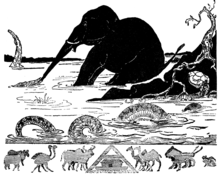just-so story
Appearance
English
[edit]Etymology
[edit]| PIE word |
|---|
| *swé |

From just so (“(almost) exactly or precisely like something”, adjective) + story, referring to the series of short stories called Just So Stories (collected in book form in 1902) by the English writer Rudyard Kipling (1865–1936)[1] which described how various animals acquired their distinctive characteristics, such as how the leopard got its spots. According to Kipling, the stories were so titled because they were intended to put his daughter Josephine (“Effie”) to sleep, “and you were not allowed to alter those by one single little word. They had to be told just so; or Effie would wake up and put back the missing sentence.”[2]
Pronunciation
[edit]- (Received Pronunciation) IPA(key): /ˌd͡ʒʌstˈsəʊ ˌstɔːɹi/
Audio (Southern England): (file) - (General American) IPA(key): /ˌd͡ʒʌstˈsoʊ ˌstɔɹi/
Noun
[edit]just-so story (plural just-so stories)
- A story which supposedly explains the beginning or early development of a current state of affairs; a myth, a pourquoi story.
- Coordinate terms: backstory, origin story
- (literature) A story, especially one for children, featuring animals as characters.
- (social sciences, especially anthropology, philosophy, chiefly derogatory) An untestable explanation for something, such as a form of behaviour, a biological trait, or a cultural practice.
- 1978 November 16, Stephen Jay Gould, “Sociobiology: The Art of Storytelling”, in Bernard Dixon, editor, New Scientist, volume 80, number 1129, London: IPC Magazines, →ISSN, →OCLC, page 532:
- Sociobiological explanations of human behaviour encounter two special difficulties, suggesting that a Darwinian model may be generally inapplicable in this case. […] Secondly, the standard foundation of Darwinian just-so stories does not apply to humans. That foundation is the implication: if adaptive, then genetic—for the inference of adaptation is usually the only basis of a selective story, and Darwinism is a theory of genetic change and variation in populations.
Translations
[edit]story which supposedly explains the beginning or early development of a current state of affairs — see also myth
|
story, especially one for children, featuring animals as characters
untestable explanation for something
|
References
[edit]- ^ “just-so story, n.”, in OED Online
 , Oxford: Oxford University Press, July 2023.
, Oxford: Oxford University Press, July 2023.
- ^ Rudyard Kipling (1897 December) “The ‘Just-so’ Stories”, in Mary Mapes Dodge, editor, St. Nicholas: An Illustrated Magazine for Young Folks, volume XXV, part I, number 2, New York, N.Y.: The Century Co.; London: Macmillan and Co., →OCLC, page 89.
Further reading
[edit] just-so story on Wikipedia.Wikipedia
just-so story on Wikipedia.Wikipedia
Categories:
- English terms derived from Proto-Indo-European
- English terms derived from the Proto-Indo-European word *swé
- English terms derived from the Proto-Indo-European root *h₂yew-
- English terms derived from the Proto-Indo-European root *weyd-
- English terms with IPA pronunciation
- English terms with audio pronunciation
- English lemmas
- English nouns
- English countable nouns
- English multiword terms
- en:Literature
- en:Social sciences
- en:Anthropology
- en:Philosophy
- English derogatory terms
- English terms with quotations
- en:Rudyard Kipling
